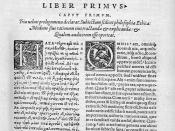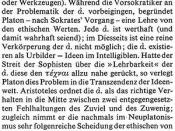After Aristotle instructs us about how to become virtuous in Book II of the Nicomachean Ethics he concludes that "we should lean sometimes in the direction of excess and sometimes in the direction of deficiency, for by doing so we shall most easily attain the mean and goodness." Some would interpret by this that Aristotle believes that the training or effort by which one is brought to the mean, which is virtue, involves doing what is bad. But to think that Aristotle would hold that one would have to do evil in order to be good is absurd, as is clear from his own words, "...and no one who is to become good will become good unless he does good things." Thus a different and more fitting interpretation must be set forth. By looking into what virtue is and in what ways it is a mean, and also by expounding upon Aristotle's "process" of becoming virtuous it will be shown that what we do or aim at is not bad, but is rather "good" in a sense or only appears to us to be bad because of our viciousness.
We should first define virtue because it is the topic of our discussion. Aristotle's formal definition of virtue is "a habit, disposed toward action by deliberate choice, being at the mean relative to us, and defined by reason as a prudent man would define it." The last two clauses of the definition are the most important to our argument, but in order to be thorough in our investigation we shall briefly examine the first two clauses as well.
Aristotle shows that virtue is a habit through a process of elimination. He knows that virtue must be in the soul so he looks at the three things in it, namely...


